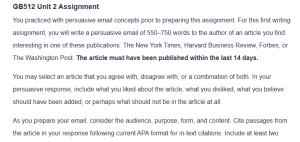GB512 Unit 2 Assignment
Persuasive Email
To: Lydia DePillis
From: Student’s Name
Date: 15/07/2024
Subject: Thoughtful feedback on your article “For L.G.B.T.Q. People, Moving to Friendlier States Comes with a Cost”
Sender’s Title: Student
Recipient’s Title: Reporter for The New York Times
As the author of the New York Times article “For L. G. B. T. People, Moving to Friendlier States Comes with a Cost,” I would like to give constructive feedback using this persuasive email. Your article provides a thorough and engaging discussion of the issues about the difficulties of queer individuals who attempt to migrate to areas that are more tolerant of their existence. It was your article’s central idea that due to growing discrimination of minorities, especially those belonging to the transgender community and the queer population in particular, people must flee their states in the United States, which has become unsafe for them. However, this choice leaves many with no option. They move to more progressive regions characterized by higher cost of living. As the bottom line of the article, LGBTQ+ communities must adopt rough options to protect themselves.
Having read your article, I consider it comprehensive, focused on the financial burden affected, and the advocation for support of the affected community. The reporting made in the article is quite commendable. It goes to the extent of exploring the experiences of various people such as Lily Weeks, Stefanie Newell, and Mindi Mercer to offer real-life examples of how the wave of legislative attacks has spelled doom on the LGBTQ+ community (DePillis, 2024). For instance, the article notes, “That’s why Mindi Mercer transplanted her four children from Raleigh, N.C., to Michigan last year.” Further, the article draws insights from experts and data like Abbie Goldberg, which offers credibility to the article’s conclusions. The article places significant emphasis on the financial challenges that the affected communities undergo because of their gender orientation. Notably, this is a strength of the article because the identified issues contrast relative affordability in the two home options for the communities that are often overlooked.
It is great that you included such institutions as the Campaign for Southern Equality and the PFund Foundation that help financially and LGBTQ+ people and their families. They emphasize how important advocacy and charitable organizations are in easing the hardships experienced by people compelled to disrupt their lives (Forsythe et al., 2022). Moreover, the presentation of such projects as the Trans-Continental Pipeline, which is designed to become a supportive environment for the representatives of the transgender community in Denver, reveals a practical necessity for the bottom-up approach.
Despite the viewpoint taken, the article could have been improved in some areas. First, exploring the emotional and psychological impact on the affected individuals could be crucial. The possible financial effects are described quite comprehensively. However, regarding the psychological reactions of forced movers among LGBTQ+ people, I believe the article could be more detailed in its presentation. There are far more palpable difficulties to point out in such a case, like stress, anxiety, and a sense of loss that are so typical for people who experience such changes in their lives (Bosley‐Smith, 2023). Second, the article could have emphasized more about root causes. Perhaps looking at the patterns of why and how these lawmakers and interest groups craft these legislations may be helpful to get to the root of the problem and provide a framework of action. Lastly, a broader geographic perspective could have been adopted. Notably, this could help readers gain a clearer understanding of the varying degrees of accessibility and affordability for LGBTQ+ individuals seeking refuge.
References
Bosley‐Smith, E. R. (2023). Anticipatory economic stressors: Perceived and potential sources of economic disadvantage for L.G.B.T.Q. Adults. Sociological Inquiry, 93(3), 465–495.
DePillis, L. (2024, July 11). For L.G.B.T.Q. People, Moving to Friendlier States Comes With a Cost. The New York Times – Breaking News, U.S. News, World News and Videos. https://www.nytimes.com/2024/07/11/business/economy/lgbtq-moving-cost.html
Forsythe, A., Pick, C., Tremblay, G., Malaviya, S., Green, A., & Sandman, K. (2022). Humanistic and economic burden of conversion therapy among L.G.B.T.Q. Youths in the United States. JAMA pediatrics, 176(5), 493-501.
ORDER A PLAGIARISM-FREE PAPER HERE
We’ll write everything from scratch
Question
GB512 Unit 2 Assignment
You practiced with persuasive email concepts prior to preparing this assignment. For this first writing assignment, you will write a persuasive email of 550–750 words to the author of an article you find interesting in one of these publications: The New York Times, Harvard Business Review, Forbes, or The Washington Post. The article must have been published within the last 14 days.

GB512 Unit 2 Assignment
You may select an article that you agree with, disagree with, or a combination of both. In your persuasive response, include what you liked about the article, what you disliked, what you believe should have been added, or perhaps what should not be in the article at all.
As you prepare your email, consider the audience, purpose, form, and content. Cite passages from the article in your response following current APA format for in-text citations. Include at least two additional references published within the last year that support your points. Provide a references page that includes at least three references — the article you are responding to, and the two supporting references.
Peer-reviewed academic articles, articles published in journals, textbooks, and library resources in the Purdue University Global library databases are examples of high quality resources. Note: Wikipedia, Investopedia, and blogs etc., are not considered reliable resources for this research.

